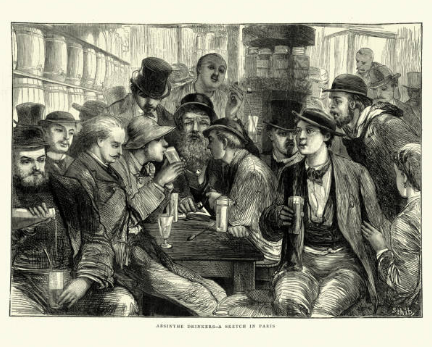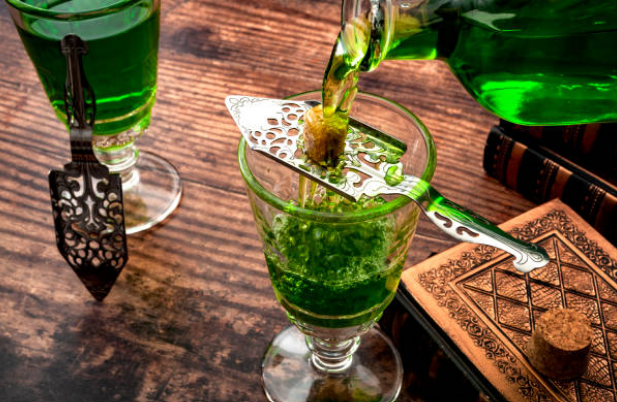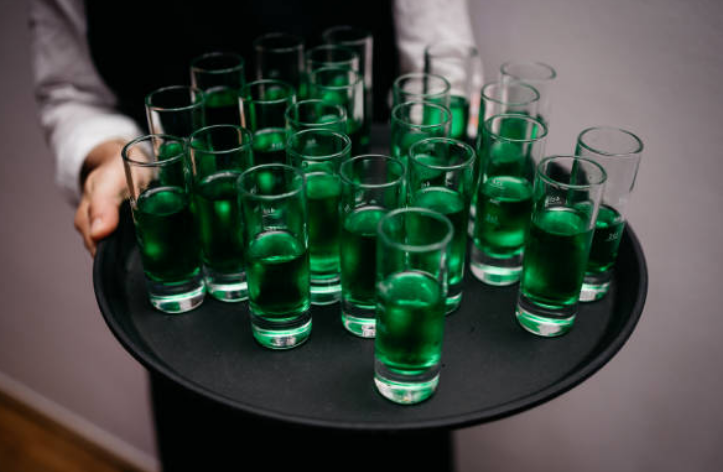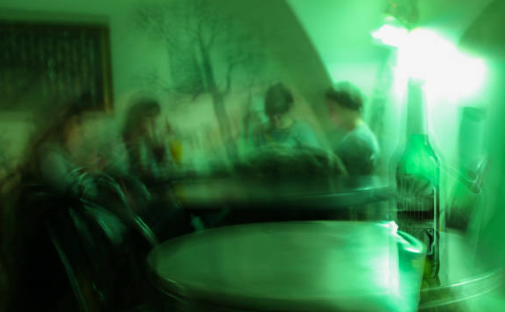What Is Absinthe?
Often referred to as the “Green Fairy” due to its distinctive emerald hue, absinthe is a drink that has long captivated the imaginations of artists, writers, and adventurers. But what is absinthe, and why does it elicit such fascination?
We will delve into what is absinthe and gain a comprehensive understanding of this iconic spirit. We’ll explore the definition of absinthe, and its effects and reveal the historical tapestry surrounding it.
The We Level Up Treatment Center is a trusted resource for those seeking help with alcohol abuse. If you have any drinking problems, we’re ready to help. Get a free assessment. Call our helpline today.
Absinthe Alcohol Definition
Absinthe is a highly alcoholic distilled spirit characterized by its distinctive green color and a complex flavor profile dominated by the taste of anise. It is traditionally made by macerating or distilling a combination of botanicals, including wormwood (Artemisia absinthium), green anise, and fennel, in a neutral alcohol base. The inclusion of wormwood is notable because it contains thujone. This compound has historically been associated with the perceived hallucinogenic effects of absinthe, though these effects have been largely debunked.
History of Absinth
- Early Origins: Absinthe’s roots trace back to ancient herbal remedies.
- 17th Century: The drink we recognize as absinthe began to take shape in Switzerland and France as a medicinal tonic.
- 19th Century: Absinthe gained immense popularity, becoming the choice of European artists and bohemians.
- Absinthe Ritual: The famous “absinthe ritual” with water and sugar became popular.
- Controversy and Banning: Absinthe was banned in multiple countries in the early 20th century due to concerns over thujone content.
- Decline and Prohibition: Absinthe production and consumption declined during the bans, and alternatives emerged.
- Revival: In the late 20th century, absinthe was legally revived as research dispelled myths about its dangers.
- Modern Absinthe: Absinthe is produced and enjoyed legally in various countries today, with regulations on thujone levels.
- Cultural Icon: Absinthe remains a cultural symbol, celebrated for its flavor, ritual, and historical associations.


Skip To:
Learn More:
- Free Online Drug And Alcohol Tests, Quizzes, & Assessments
- Alcohol And Drug Assessment. Find Drug and Alcohol Assessment Near Me. What Should You Expect An Alcohol and Drug Assessment?
- How to Flush Alcohol Out of Your System?
- Online Confidential Am I An Alcoholic Quiz For Free
- Free Online Drug And Alcohol Tests, Quizzes, & Assessments
- Free BAC Calculator. Complete Online Blood Alcohol Calculator. Find Blood Alcohol Level with BAC Calc. Easy Alcohol Calculator BAC Chart.
- AWS or Alcohol Withdrawal Timeline Symptoms, Seizures, Signs & Alcohol Withdrawal Detox Treatment
Absinthe Alcohol Fact Sheet
History:
- Absinthe’s origins trace back to the late 18th century, with its modern form developed in Switzerland.
- It gained popularity in the 19th century, particularly in Europe, becoming associated with bohemian culture and artistic circles.
- Due to concerns over its safety and alleged hallucinogenic properties, absinthe was banned in several countries during the early 20th century but has since been revived.
Ingredients:
- Absinthe is typically made from a neutral alcohol base, often from grapes or grains.
- Essential botanicals include wormwood (Artemisia absinthium), green anise, fennel, and various herbs and spices.
- Wormwood contains thujone, a compound historically believed responsible for absinthe’s alleged hallucinogenic effects.
Flavor and Appearance:
- Absinthe has a complex flavor profile with dominant notes of anise and a subtle herbal and earthy quality.
- When water is added, absinthe undergoes the “louche” effect, turning from clear green to cloudy white due to the precipitation of essential oils.
Preparation:
- Absinthe is traditionally served by pouring ice-cold water over a sugar cube resting on a slotted spoon and placed on top of a glass of absinthe.
- This gradual dilution brings out the flavors and aromas and creates the characteristic louche.

Get Your Life Back
Find Hope & Recovery. Get Safe Comfortable Detox, Addiction Rehab & Dual Diagnosis High-Quality Care.
Hotline(844) 597-1011Absinthe Alcohol Statistics
Absinthe, the iconic and often mystifying spirit, has a rich history and a devoted following among connoisseurs and enthusiasts. To shed light on the fascinating world of absinthe, we’ll explore some key statistics related to its production, consumption, and cultural significance. These statistics provide insights into the enduring allure of absinthe in today’s world.
- Historical Global Production: In the early 2000s, global absinthe production was estimated to be around 200,000 liters annually. However, this number has likely increased over the years due to the resurgence of interest in absinthe.
- Leading Producing Countries: Historically, France, Switzerland, and the Czech Republic have been prominent producers of absinthe. France, in particular, has a rich history of absinthe production, especially in regions like Pontarlier.
- Absinthe Exports: France and Switzerland have traditionally been the leading exporters of absinthe, with distribution to various countries, including the United States and European nations.
- Consumption Trends: Absinthe consumption has been revived, particularly in cocktail culture. Classic cocktails like the Sazerac and the Absinthe Frappé have regained popularity in bars and restaurants.
- Legalization and Regulation: Absinthe was legalized in the United States in 2007, producing various domestic brands. Regulations in the U.S. limit thujone levels in absinthe to ensure safety.
- Absinthe Tourism: Regions such as the Val-de-Travers in Switzerland and the Jura region in France have witnessed a surge in absinthe tourism, with distillery tours and tastings attracting enthusiasts and tourists.
141,000
140,557 Americans die from the effects of alcohol in an average year.
Source: NIAAA
10%
1-in-10 Americans over the age of 12 have an Alcohol Use Disorder.
Source: NIAAA
60%
Over half of Americans increased their alcohol consumption during COVID-19 lockdowns.
Source: NIAAA
Absinthe Effects
The effects of absinthe are a subject of historical fascination and controversy. Absinthe is known for its high alcohol content and the presence of certain botanical ingredients, particularly wormwood, which contains thujone, a compound that has contributed to its mystique. Here are some key points regarding the effects of absinthe:
- Alcohol Content: Absinthe is a highly alcoholic spirit, typically ranging from 45% to 74% alcohol by volume (90 to 148 proof). Like any alcoholic beverage, excessive consumption of absinthe can lead to intoxication, impaired judgment, and various health risks associated with alcohol.
- Thujone Content: Thujone is a compound found in wormwood, one of the botanicals used in absinthe production. In the past, it was believed that thujone in absinthe had hallucinogenic properties and could cause madness. However, modern research has debunked these claims. The thujone content in most absinthes is typically shallow and insufficient to induce hallucinations or adverse psychological effects.
- Neurological Effects: The primary psychoactive component in absinthe is alcohol, and its effects are consistent with those of other strong alcoholic beverages. Absinthe can lead to feelings of euphoria, relaxation, and disinhibition. However, excessive consumption can also result in dizziness, impaired coordination, memory lapses, and even alcohol poisoning.
- Louche Effect: One of the unique visual effects associated with absinthe is the “louche.” When water is added to absinthe, it turns cloudy and opaque. This phenomenon is caused by the precipitation of essential oils from the botanicals in the absinthe. The louche is an integral part of the absinthe-drinking experience but is unrelated to its psychoactive effects.
- Mood and Creativity: Some historical accounts and anecdotal reports have suggested that absinthe may have stimulated creativity and artistic expression. This association may be more symbolic than scientifically proven, as the mood-altering effects of alcohol can vary significantly from person to person.
- Responsible Consumption: As with any alcoholic beverage, it’s essential to consume absinthe responsibly. Drinking in moderation is vital to avoiding the negative consequences of alcohol misuse. Absinthe should be enjoyed for its unique flavor and cultural significance rather than for any perceived psychoactive effects.
In summary, the effects of absinthe are primarily attributed to its high alcohol content, and any historical claims of hallucinogenic properties are mainly unfounded. While absinthe has a rich cultural history and a unique ritual associated with its consumption, it should be enjoyed with caution and in moderation to ensure a safe and enjoyable experience.
Get Help. Get Better. Get Your Life Back.
Searching for Accredited Drug and Alcohol Rehab Centers Near You?
Even if you have failed previously and relapsed, or are in the middle of a difficult crisis, we stand ready to support you. Our trusted behavioral health specialists will not give up on you. When you feel ready or just want someone to speak to about therapy alternatives to change your life call us. Even if we cannot assist you, we will lead you to wherever you can get support. There is no obligation. Call our hotline today.
(844) 597-1011Is Absinthe Legal in US?
Yes, absinthe is legal in the United States. The ban on absinthe in the U.S., which had been in place since 1912, was lifted in 2007. Before this, absinthe had a notorious reputation due to misconceptions about its safety and alleged hallucinogenic effects, primarily attributed to thujone, a compound found in wormwood. However, modern scientific research showed that thujone levels in absinthe were not a cause for concern.
As a result, the U.S. Alcohol and Tobacco Tax and Trade Bureau (TTB) revised its regulations, allowing the sale and production of absinthe with thujone levels within established limits. Today, you can find various absinthe brands legally available in the United States, and it has become a sought-after spirit among cocktail enthusiasts and connoisseurs.

Does Absinthe Make You Hallucinate?
The notion that absinthe makes you hallucinate is a longstanding and widely debated myth. While absinthe does contain thujone, a compound found in wormwood, there is no scientific evidence to support the idea that the thujone levels in absinthe, when consumed in moderation, can induce hallucinations or any significant psychoactive effects.
Historically, absinthe gained a reputation for causing hallucinations, madness, and even criminal behavior, leading to bans and restrictions in many countries, including the United States. However, these beliefs were primarily based on misconceptions, moral panic, and a lack of scientific understanding.
Modern research has shown that thujone levels in absinthe are typically deficient and well within safety limits. The psychoactive effects historically associated with absinthe consumption were more likely due to its exceptionally high alcohol content, which can lead to altered perceptions, intoxication, and behavioral changes when consumed to excess.
In summary, when consumed responsibly and in moderation, absinthe does not make you hallucinate or induce significant psychoactive effects beyond any other high-proof alcoholic beverage. The myths surrounding absinthe’s hallucinogenic properties have largely been debunked, and it is enjoyed today for its unique flavor and cultural significance.
First-class Facilities & Amenities
World-class High-Quality Addiction & Mental Health Rehabilitation Treatment
Rehab Centers TourRenowned Addiction Centers. Serene Private Facilities. Inpatient rehab programs vary.
Addiction Helpline(844) 597-1011Proven recovery success experience, backed by a Team w/ History of:
15+
Years of Unified Experience
100s
5-Star Reviews Across Our Centers
10K
Recovery Success Stories Across Our Network
- Low Patient to Therapist Ratio
- Onsite Medical Detox Center
- Comprehensive Dual-Diagnosis Treatment
- Complimentary Family & Alumni Programs
- Coaching, Recovery & Personal Development Events
Absinthe Alcohol Content

The alcohol percentage (alcohol by volume, ABV) of absinthe typically varies depending on the brand and specific product. However, absinthe is known for its high alcohol content, ranging from approximately 45% to 74% ABV. Some powerful versions can even exceed 74% ABV.
It’s important to note that absinthe is one of the most potent alcoholic beverages available, and its potency is a characteristic feature of the spirit. Because of its high alcohol content, absinthe is often diluted with water before consumption, typically at a ratio of 1:3 to 1:5 (absinthe to water), which also leads to the creation of the louche, a cloudy and opalescent appearance in the drink.
It’s crucial to exercise moderation and drink responsibly when enjoying absinthe, given its strength and potential to cause intoxication if consumed too much.
Absinthe Alcohol Abuse Treatment at We Level Up Treatment Center
Treating alcohol abuse, including absinthe abuse, is essential for individuals struggling with alcohol addiction. While absinthe may not be more addictive than other alcoholic beverages, its high alcohol content can contribute to alcohol use disorder (AUD) if consumed excessively. Here are some critical steps and considerations for treating absinthe alcohol abuse:
- Assessment and Diagnosis: Evaluate the extent of alcohol abuse and identify underlying health issues.
- Detoxification (Detox): Provide supervised detox for severe cases to manage withdrawal symptoms safely.
- Therapy: Utilize behavioral therapy and counseling to address triggers and behavior patterns.
- Support Groups: Encourage participation in support groups like Alcoholics Anonymous.
- Medications: Consider medication when needed for managing cravings or co-occurring mental health conditions.
- Education: Provide information on the risks of alcohol abuse.
- Relapse Prevention: Teach strategies for identifying triggers and creating a relapse prevention plan.
- Lifestyle Changes: Promote a healthy lifestyle, including exercise, nutrition, and stress management.
- Family Involvement: Include family members in treatment to build a strong support network.
- Aftercare: Establish continuing care and aftercare programs for ongoing support.
- Dual Diagnosis: Address co-occurring mental health conditions in treatment.
Remember that the treatment approach should be tailored to the individual’s unique circumstances and needs, and recovery is an ongoing process that often requires long-term support and commitment.
With our experienced and compassionate staff, evidence-based therapies, and a supportive environment, We Level Up Treatment Center is dedicated to helping individuals achieve lasting recovery from alcohol abuse.
World-class, Accredited, 5-Star Reviewed, Effective Addiction & Mental Health Programs. Complete Behavioral Health Inpatient Rehab, Detox plus Co-occuring Disorders Therapy.
CALL(844) 597-1011End the Addiction Pain. End the Emotional Rollercoaster. Get Your Life Back. Start Drug, Alcohol & Dual Diagnosis Mental Health Treatment Now. Get Free No-obligation Guidance by Substance Abuse Specialists Who Understand Addiction & Mental Health Recovery & Know How to Help.
Popular FAQs about What Is Absinthe
-
What does absinthe taste like?
Absinthe has a complex flavor profile with prominent notes of anise and herbal and earthy undertones. The flavor can vary slightly among different brands and types of absinthe.
-
Is absinthe safe to drink?
Absinthe is safe to drink when consumed responsibly and in moderation. As with any alcoholic beverage, excessive consumption can lead to health risks, so it’s important to enjoy it responsibly.
-
Does absinthe make you hallucinate?
No, absinthe does not typically induce hallucinations. The belief that absinthe causes hallucinations is a myth and has been debunked. Any altered experiences often result from its high alcohol content when consumed excessively.
-
Is absinthe legal?
Absinthe is legal in many countries, including the United States and Europe. However, regulations regarding thujone content (a compound found in wormwood) may apply in some regions.
Experience Transformative Recovery at the We Level Up Treatment Center.
See our authentic success stories. Get inspired. Get the help you deserve.
Experience Transformative Recovery at We Level Up Treatment Centers.
See our authentic success stories. Get inspired. Get the help you deserve.
Start a New Life
Begin with a free call to an addiction & behavioral health treatment advisor. Learn more about our dual-diagnosis programs. The We Level Up Treatment Center Network delivers recovery programs that vary by each treatment facility. Call to learn more.
- Personalized Care
- Caring Accountable Staff
- World-class Amenities
- Licensed & Accredited
- Renowned w/ 100s 5-Star Reviews
We’ll Call You
Powerful Video Overcoming Addiction
Jen’s Addiction Recovery Story
Reclaiming My Life: Overcoming Addiction and Rebuilding Relationships
I longed for my old life, but addiction had turned me into a mere shell of myself. I yearned to regain the trust of my loved ones, especially my children and family. It all started innocently enough, with a car accident followed by getting caught up in the murky world of prescription medication. Before I knew it, I was trapped in a fog of addiction. My mind justified it, telling me it was okay because a doctor prescribed it.
Little did I realize, I was spiraling down a dangerous path. Thankfully, Level Up came into my life, providing support for my family and nurturing my personal growth. When I first walked through their doors, I was filled with fear and intimidation. However, their guidance and teachings have empowered me to discover my true self. And now, receiving a midday call from my twenty-one-year-old daughter, simply saying “I love you, Mom,” is nothing short of incredible.
Jen’s Addiction Recovery Testimonial
Search What Is Absinthe We Level Up Alcohol Poisoning Detox, Mental Health Topics & Resources
Sources
[1] Wittels, Betina; Hermesch, Robert (2008). Absinthe, Sip of Seduction: A Contemporary Guide tags: What Is Absinthe?
[2] https://www.ncbi.nlm.nih.gov/pmc/articles/PMC1127080/ tags: What Is Absinthe/
[3] Gerken, Sonia (2008-08-30). “Liquor ban after teen’s near death”. The Southland Times. tags: What Is Absinthe?
[4] “The Virtual Absinthe Museum: US Legalization in 2007 after 95 years of prohibition” tags: What Is Absinthe?
[5] https://www.ncbi.nlm.nih.gov/pmc/articles/PMC34311/ tags: What Is Absinthe?
[7] “Absinthe Laws”. Retrieved 11 March 2013. Customs (Prohibited Imports) Regulations 1956, retrieved 2022-12-31
[8] Australian Food Standards PDF (PDF).
[9] Cindy Skrzycki (16 October 2007). “A Notorious Spirit Finds Its Way Back to Bars” (PDF).
[10] Wells, Pete (2007-12-05). A Liquor of Legend Makes a Comeback. The New York Times. 0362-4331
Arnold, Wilfred Niels (June 1989). “Absinthe”. Scientific American. 260 (6): 112–117





